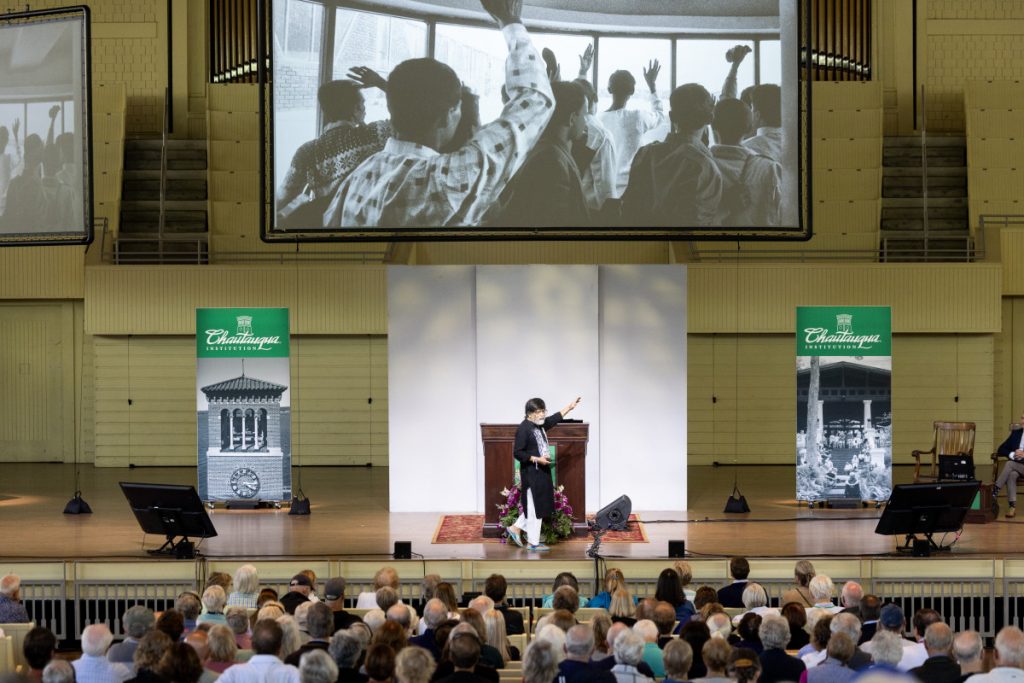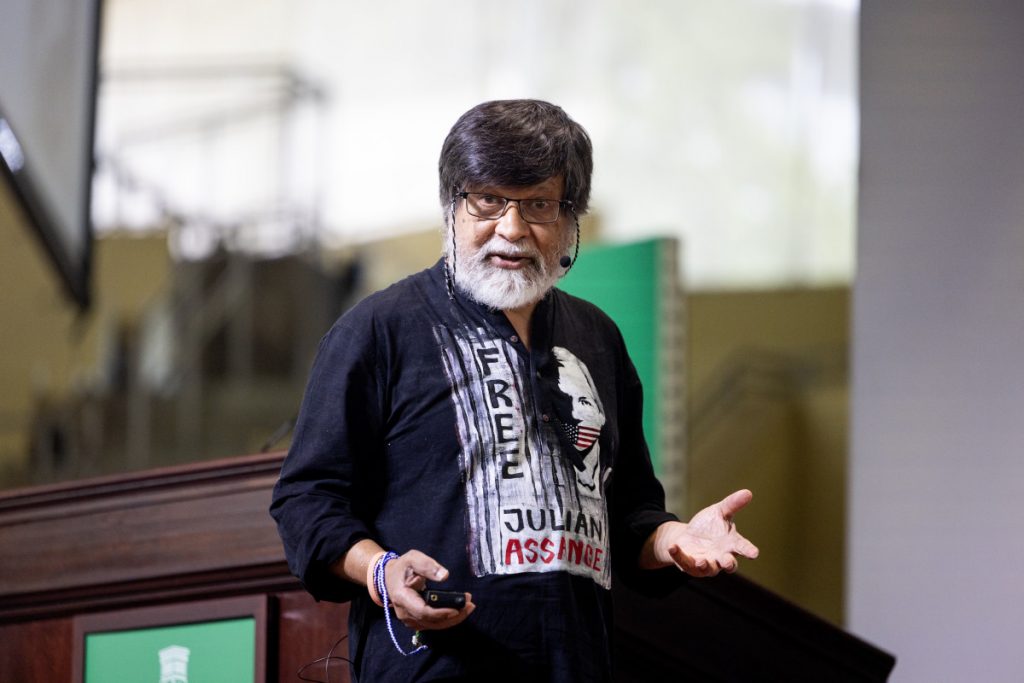
Kaitlyn Finchler
Staff writer
With a court date the same day, Shahidul Alam instead came to Chautauqua to deliver a morning lecture in an act of defiance against the Bangladeshi government because, he said, people and their work matter.
Alam, a photographer and National Geographic Explorer-at-Large, delivered his lecture at 10:45 a.m. Tuesday in the Amphitheater for Week Nine of the Chautauqua Lecture Series, “The Global South: Expanding the Scope of Geopolitical Understanding.”
“In my profession, I meet a lot of people who are persecuted with their backs up against the wall, frightened and don’t know what to do,” he said. “They faced repression on a daily basis and I can understand their situation — I’ve been there.”
For all sorts of reasons, he said, people want to give up, because there’s a limit to how much they can push themselves. If people give up, they become accomplices to the repressor.
“By accepting that status quo, by stopping to push, you have actually made it possible for them to no longer be repressive overtly,” Alam said. “Repression is then normalized.”
Alam said he wants to remind people what they do matters — especially Chautauquans, since they live in “one of the most powerful countries in the world.”
“Whether you like it or not, that has an influence that we need to remember,” he said. “Your actions have consequences on the globe itself.”
He showed pictures of his parents, brother and sister. His late father, Kazi Abul Monsur, was a physician and microbiologist in Bangladesh.
Monsur received international acclaim for developing Monsur’s Media for the isolation of cholera, as well as setting up the first intravenous fluid plant in Bangladesh, while serving as the director of the Institute of Public Health.
His relationship with his brother, seven years his senior, was the closest Alam had ever been to someone — other than his partner — before he died by suicide. His sister, nine years older, is a retired bacteriologist living in London.
His mother was a highly educated Muslim woman — just one of a few — and when she received backlash for wanting to set up a school, she set up a tent with 14 kids and created a kindergarten class, which eventually became a brick-and-mortar school for girls.
Fast-forward to the 1971 liberation of Bangladesh, following a bloody civil war and genocide, when the Pakistani army rounded up the leading intellectuals of the country before surrendering.
A photo of this, by Bangladeshi photojournalist Rashid Talukder, Alam said, illustrates many things.
“From a personal point of view, we had a liberated country, but we didn’t have the people to run it,” he said. “Not only had (Bangladesh) been decimated, the people were not there.”

His parents, although not wealthy, put together enough for Alam’s ticket to Liverpool, England, to live with his sister, who was already there with her husband.
At 17 years old, Alam worked odd jobs and attended the Liverpool Institute — namely because he knew The Beatles studied there — and graduated with a degree in biochemistry and genetics.
“Being from an academic family, I then went on to do a Ph.D. in organic chemistry in London,” he said. “I loved that carefree life. I was discovering girls for the first time. I was having a great time.”
While indulging in everything he could, Alam said he became involved with the Socialist Workers Party and participated in pro-LGBT and anti-racism marches.
“What impressed me was that they used images so effectively in their campaign,” he said. “Perhaps because of the war of liberation, but also generally, I was very committed to social justice.”
This led Alam to wonder if Bangladesh really needed another research chemist, and he could possibly contribute more as a photographer. He decided to move back to Bangladesh, mostly because he didn’t know his parents as an adult, and they were very special to him.
“Having led this Bohemian life in London, I knew it was not going to be easy to live with my parents as an adult,” he said. “I thought, ‘Yeah, this is something I need to do.’ ”
Suspecting it was more difficult for his parents than him, Alam said the difficulties didn’t come from where he’d expected.
“I’d forgotten some of the things that we took for granted,” Alam said. “In a country like Bangladesh, most middle-class homes have home help, as we did in ours.”
As a photographer, he said, the difference is knowing photographers take pictures that can change the world. There was a young man, Mizan, who cleaned their television room while they watched TV, but wouldn’t sit in the room with them; he stood in the doorway and watched.
“Physically, it’s a small distance, but culturally, politically (and) socially, it’s a chasm,” Alam said. “It’s something we recognize (and) take on board without ever questioning it.”
After taking a photo of Mizan in the doorway, Alam printed it out and gave it to Mizan and Alam’s mother. This, he said, was a simple solution, and it made a difference.
“I could see how with my pictures, I could make a difference,” he said. “I began to do other things. Some of the stories I began to document were about the true heroes of Bangladesh — migrant and garment workers, and farmers.”
These people, he said, are the wealth of the nation, and provide Alam with the privileged life he had. However, these are the same people who are most deprived, and not seen as human beings.
Alam began to document the lives of migrant workers, who often come from villages and are not allowed in the airport, so they camp outside. Their goodbye to their families, he said, was speaking through a cracked glass wall and broken joints in the door.
“This is also a way of bringing humanity back to the story, because they are treated as the laborers who toil and do what they do,” he said. “We do not always see them as fellow human beings, and that’s what I was trying to (capture) — parting, hope, sadness, emotions we can relate to.”
Another thing Alam noticed upon returning to Bangladesh was he left an independent country, and came back to a military dictatorship. He joined the resistance and took photos of the movement, which is his central body of work.
Protestor Noor Hossain painted his back with the phrase, “let democracy be free,” and went to a Nov. 10, 1987, protest. He was killed by police the same day.
“Later on, in 1988, there was a massive flood,” Alam said. “These are the pictures you associate with Bangladesh — disasters, famine and starvation. Those are the tropes that my country, which I call majority-world countries, are known by.”
However, Alam said he wanted to tell another side of the story. On Nov. 10, 1989, he wanted to put together an exhibit of the flood pictures — along with an image of a hugely opulent wedding, held during the flooding, for the daughter of a powerful minister.
“The minister happened to own one of the largest newspapers, so no one talked about it,” Alam said. “I took this picture and I juxtaposed the flood pictures with (the wedding), and that’s what made it problematic.”
No gallery would show this juxtaposition, he said, which led Alam to set up the Drik Picture Library.
As a middle-class male photographer, Alam said he was also part of an inherent power structure. This realization sparked a collective for women photographers, Onno Chokhe Dekha, to produce thought-provoking, powerful work.
Although a step in the right direction, Alam said they realized the photographers were all still middle-class. Despite the increased gender representation, working-class people needed to be involved.
Another issue that drew Alam’s attention was the AIDS crisis in Bangladesh, which led him to do a story on a group of sex workers who had been offered parliament grants.
Hajera, a woman he documented who became a close friend, took all of her savings and set up an orphanage for children of other sex workers.
“She had a very hard life and she wanted life to be different for others,” Alam said. “Obviously, they don’t have the money for a blackboard so they improvised their floor (into) a giant slate.”
Alam set up the Chobi Mela International Photography Festival, the first photography festival in Bangladesh. He made it so if people couldn’t go to galleries, the galleries would go to them.
This led to backlash from the Chinese government, who were not too fond of showcases about Tibet. They brought tea and silk ties — Alam noted he’s never worn a tie in his life. He said he was going to show the work anyway.
“They were not convinced,” he said. “They leaned on the Bangladesh government, which then leaned on us, and eventually the riot police arrived.”
When the police came, they were prepared. The work, Alam said, couldn’t technically be shut down, because there were no pictures of blood, violence or bodies.
“We took the government to court,” he said. “We had also prepared, we live-streamed the whole thing. … They didn’t know what the hell was going on.”
The Bangladeshi government didn’t particularly like photography, Alam said, and the artform isn’t recognized, appreciated or treated with importance.
“I’d made a conscious decision that I would not allow, in my future work, for the politics of my work to be separate from the art,” he said.
Alam then pivoted to coverage of road safety protests and the government’s violent response. A majority of the protests were led by children.
On Aug. 5, 2018, Alam was taken from his home shortly after giving an interview to Al Jazeera and posting live videos on Facebook that criticized the government’s violent response to the protest.
“Over 100 leading citizens came out in protest,” he said. “(Including) people who were close to the government but criticizing the government for their position. There were changes taking place, but there were others protesting as well.”
Alam then showed a picture of himself in the hospital after being incarcerated.
“I was in the hospital, recovering from the torture that had been inflicted,” he said. “My fellow prisoners came up to me and said, ‘We want this picture.’ We managed to smuggle in a book … I recovered from the hospital (and) on the outer wall of the hospital is this 12-foot mural they painted.”
Alam has been charged with spreading false information and making provocative statements; the government, he said, has no evidence to support that claim. Every month since his release, Alam has had to make a court appearance. Yesterday, the day of his lecture, was his August court date.
“In 10 hours from now, I face a court appearance in Dhaka,” he said. “My lawyers feel it has been deliberately timed to ensure that I cannot be here with you. I made a conscious choice of coming, of risking being arrested upon my return.”
He did this, he said, because he feels his message matters, and that Chautauqua matters.
“Approximately 25 people were being extrajudicially killed every month in Bangladesh,” Alam said. “The day the U.S. announced sanctions against those considered responsible, the killings stopped.”
However, the killings, disappearances and tortures started again. Alam said he doesn’t like sanctions against his country, but if that’s what it takes to save lives, he will “swallow it.”
“There are people out there on the other side of the globe who demand justice, who feel you can be an ally — who feel there have been times when you’ve turned away and have let things happen because it’s expedient to do so,” Alam said. “You sometimes have put up with pliant dictators because they’re more easy to do business with. I think it is time you stood on the right side of history. You matter (and) we matter.”




